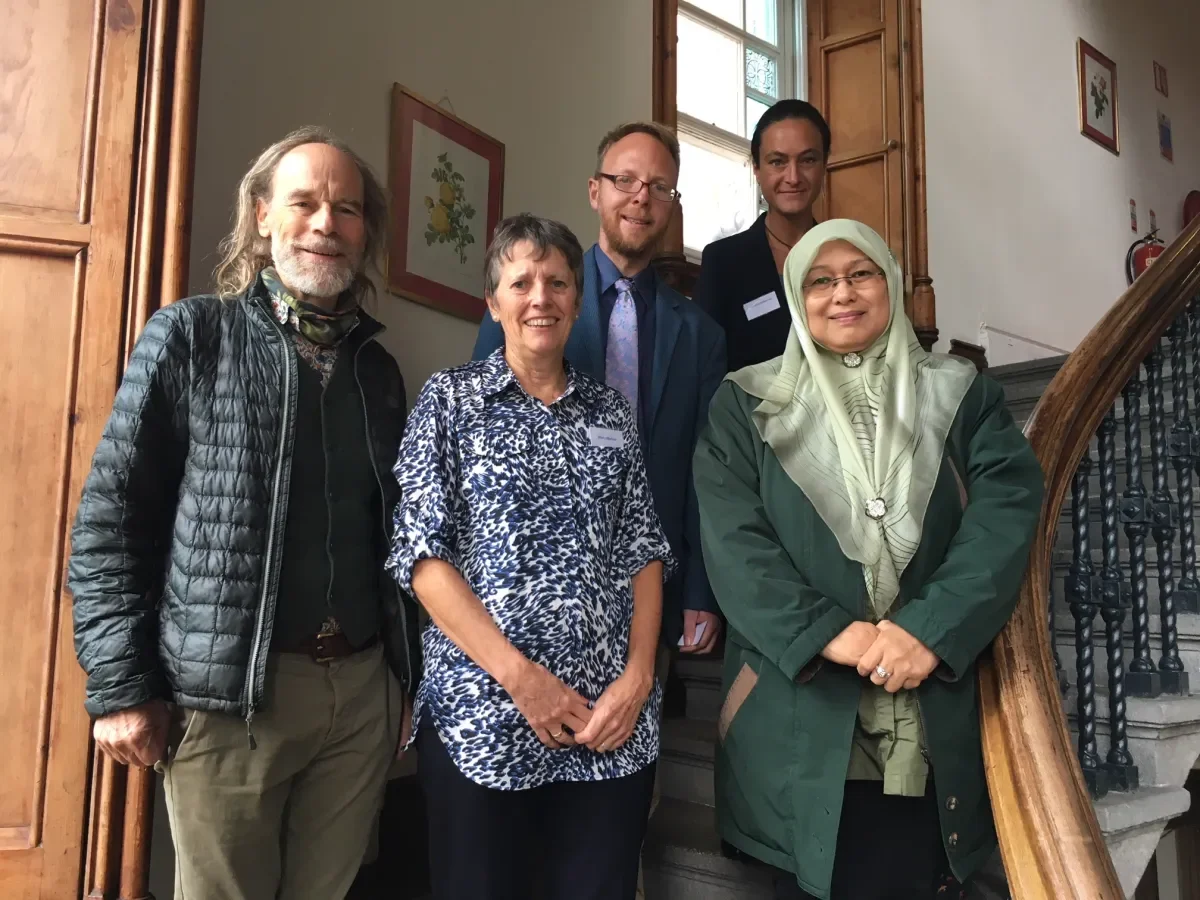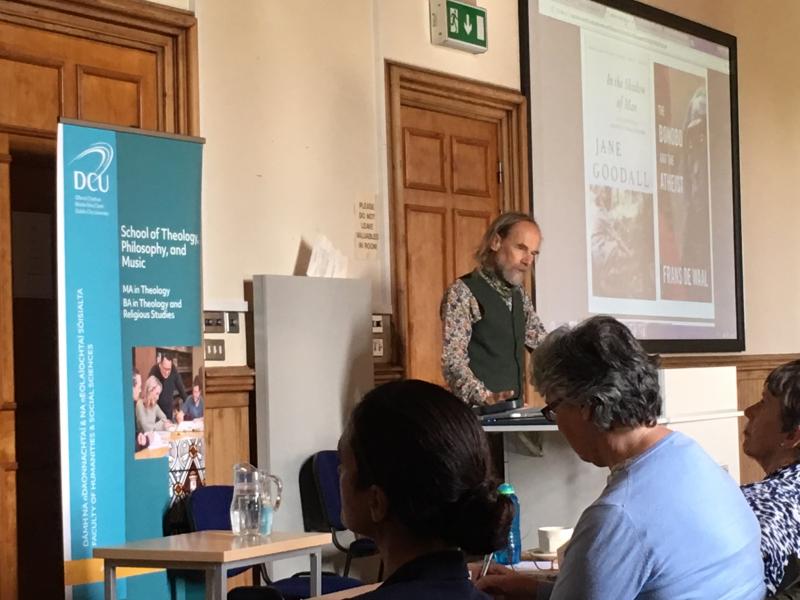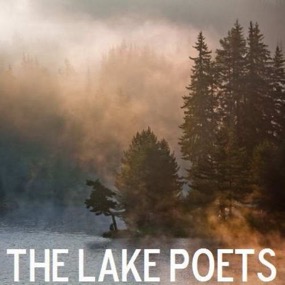

Thoughts and Reflections on The Sixth Extinction: A Symposium on Religion and Climate Change
Thoughts and Reflections on
The Sixth Extinction: Interreligious Insights, Warnings, and Questions
A Symposium on Religion and Climate Change
This symposium was attended by academics from a range of disciplines (Theology, Communications, Law, Ethics, and Philosophy), field workers, scientists, NGO workers, interfaith experts, and doctoral students. The symposium began with Dr Ethna Regan, Head of the School of Theology, Philosophy, and Music at DCU, warmly welcoming everyone. Dr Regan noted how in her five years working and living in Samoa, the effects of climate change were evident everywhere. She can never forget one Samoan friend telling her of a part of the island that was now “uninhabitable for all times” because of human mistreatment of the land.
Professor Michael Northcott -- “Religion and Ecology: From the Romantics to Rewilding.”
 DCU theologian Dr Gabriel Flynn then introduced the first speaker, rightly deemed one of the preeminent scholars of religion and climate change, Dr Michael Northcott. In a wide-ranging and richly interdisciplinary talk (with thought-provoking slides), Northcott highlighted how the modern forerunners of the environmentalist movement were the Romantics, particularly the English Romantics like Wordsworth and Coleridge, and overlooked thinkers like Robert Lowth. He also reminded us of the impact John Keat’s poetry has had and reminded us of the positive role Romantics played in other countries, such as France and Germany—not to mention a similar philosophy evident in Chinese art and in Taoism.
DCU theologian Dr Gabriel Flynn then introduced the first speaker, rightly deemed one of the preeminent scholars of religion and climate change, Dr Michael Northcott. In a wide-ranging and richly interdisciplinary talk (with thought-provoking slides), Northcott highlighted how the modern forerunners of the environmentalist movement were the Romantics, particularly the English Romantics like Wordsworth and Coleridge, and overlooked thinkers like Robert Lowth. He also reminded us of the impact John Keat’s poetry has had and reminded us of the positive role Romantics played in other countries, such as France and Germany—not to mention a similar philosophy evident in Chinese art and in Taoism.
 We can walk and enjoy the Lake District because of the advocacy of such Romantics who saw and highlighted the Spirit within all of nature. In a tour de force showing origins and effects of climate change, Northcott also highlighted leaders and thinkers in protecting and preserving our ecology, such as Rachel Carson, Wendell Berry, and Jane Goodall. He also examined Pope Francis’ Laudato Si’ (http://w2.vatican.va/content/francesco/en/encyclicals/documents/papa-francesco_20150524_enciclica-laudato-si.html. Northcott highlighted sections 84 and 85, especially the phrase: “The entire material universe speaks of God’s love, his boundless affection for us. Soil, water, mountains: everything is, as it were, a caress of God.” He noted how this idea is rooted in romanticism.
We can walk and enjoy the Lake District because of the advocacy of such Romantics who saw and highlighted the Spirit within all of nature. In a tour de force showing origins and effects of climate change, Northcott also highlighted leaders and thinkers in protecting and preserving our ecology, such as Rachel Carson, Wendell Berry, and Jane Goodall. He also examined Pope Francis’ Laudato Si’ (http://w2.vatican.va/content/francesco/en/encyclicals/documents/papa-francesco_20150524_enciclica-laudato-si.html. Northcott highlighted sections 84 and 85, especially the phrase: “The entire material universe speaks of God’s love, his boundless affection for us. Soil, water, mountains: everything is, as it were, a caress of God.” He noted how this idea is rooted in romanticism.
He closed his talk by examining and recommending the practise of re-wilding, with the pre-eminent example the re-introduction of wolves in Yellowstone National Park. He also recommended the book, Wilding: The Return of Nature to a British Farm by (if I may add, the aptly named) Isabella Tree.
Professor Hilary Marlow -- “Nature, Humanity and Hubris in the Hebrew Bible/Old Testament.”
Fellow Hebrew Bible/Old Testament Scholar, Dr Brad Anderson, introduced Professor Hilary Marlow. Dr Marlow began by noting that the real environmental problems were greed, selfishness, and spiritual apathy, and highlighted a recent international conference where scientists noted that religious values, traditions, and voices are needed in promoting ecological ethics and combating climate change. Her talk was divided into 5 sections:
What does the Bible have to offer? 1. Creation in the HB/OT 2. Human transience 3. Against hubris 4. Against injustice and exploitation 5. Positive ethical framework.
A few key highlights include the fact that bārā’—to create—appears 45 times in the Tanach and that the overwhelming theme is creation is Good, created by God, and we have a responsibility to care for it. She thus challenges White’s infamous thesis and puts in perspective those passages or traditions that argue the Judaic-Christian religions promoted a careless and hegemonic view towards creation. Creation’s purpose, thus, is to:
- Reveal God
- Encourage Praise of God
- Be a Witness and Example (humans can learn from non-human species, Jer 8:7)
- Highlight Humanity in Creation
 A closer reading of Scriptures, Dr Marlow argued, highlights harmony and ethical treatment of all life. For example, Sabbath/rest is the climax of the creation stories – and this Sabbath is for all of creation, human and non-human to rest in praise and thankfulness to God the creator. Human beings are transient and fragile and an ethical response of humility is essential. She then turned to the Book of Job to accentuate such a framework and worldview. Dr Marlow closed her talk stressing the role of social justice in the Bible and the overall positive ecological and ethical strands in the Tanach; for example, the rights of widows, orphans, and strangers, to glean the land.
A closer reading of Scriptures, Dr Marlow argued, highlights harmony and ethical treatment of all life. For example, Sabbath/rest is the climax of the creation stories – and this Sabbath is for all of creation, human and non-human to rest in praise and thankfulness to God the creator. Human beings are transient and fragile and an ethical response of humility is essential. She then turned to the Book of Job to accentuate such a framework and worldview. Dr Marlow closed her talk stressing the role of social justice in the Bible and the overall positive ecological and ethical strands in the Tanach; for example, the rights of widows, orphans, and strangers, to glean the land.
Professor Azizan Baharuddin, University of Malaya (Malaysia) -- “Islamic Perspective on Environmental Ethics and Climate Change”
After everyone enjoyed lunch, Dr Jonathan Kearney, Lecturer in Islamic and Judaic Studies, introduced Professor Azizan Baharuddin, who brought her expertise, enthusiasm, and openness to our third talk, here focusing not only on Islamic perspectives on Climate Change, but the effects of climate change in her homeland of Malaysia. She also examined the interfaith and ecological work she leads in the Institute of Islamic Understanding Malaysia, and finally the important role and contribution of “The Islamic Declaration on Global Climate Change” (https://unfccc.int/news/islamic-declaration-on-climate-change).
 Professor Baharuddin stressed that: religion has a major role to play in addressing and helping to solve the problem of climate change, a role that is empirically verified, especially through its ethical teaching to inspire its adherents. After providing helpful background on climate change and especially its impact on refugees and migrants, she provided stark images of its devastation in Malaysia, in terms of flooding and deforestation. In terms of the Islamic worldview on the Environment, Professor Baharuddin reminded us:
Professor Baharuddin stressed that: religion has a major role to play in addressing and helping to solve the problem of climate change, a role that is empirically verified, especially through its ethical teaching to inspire its adherents. After providing helpful background on climate change and especially its impact on refugees and migrants, she provided stark images of its devastation in Malaysia, in terms of flooding and deforestation. In terms of the Islamic worldview on the Environment, Professor Baharuddin reminded us:
“ the universe is a sign of greatness and a proof of oneness of God
˗ nature has its own natural order that is regarded as sunnatullah
˗ every element has been set to have its own functions and is likewise “needed” by other elements àhence the notion of an ecosystem
˗ any disturbance (fasad) incurred on this order will cause harm other elements as well.
- Mankind as vicegerent (khalifah) à managing the environment with prudence, wisdom & knowledge.
˗ environment is entrusted as a trust (amanah) to mankind as a whole.
˗ environment as an instrument (wasilah) to do good deeds, and this amanah should be a goal in itself.
˗ Islamic principles of Environmental Ethics include: “Unity (tawhid); Vicegerency/stewardship (khalifah); Servanthood (‘ubudiyyah);Balance (mizan)
˗ Nature (fitrah); and Trust/accountability (amanah).”
She then highlighted the value and role of green jihad (struggle), using the ethical and moral perspectives above, in dialogue with scientific findings and interfaith cooperation, and examples of action and education led by her own Institute.
In what deserves its own talk and conference (!), she passed out copies of the “The Islamic Declaration on Global Climate Change” and pointed out key features and passages, especially the Preamble:
“The pace of Global climate change today is of a different order of magnitude from the gradual changes that previously occurred throughout the most recent era, the Cenozoic. Moreover, it is human-induced: we have now become a force dominating nature. The epoch in which we live has increasingly been described in geological terms as the Anthropocene, or “Age of Humans”. Our species, though selected to be a caretaker or steward (khalifah) on the earth, has been the cause of such corruption and devastation on it that we are in danger ending life as we know it on our planet. This current rate of climate change cannot be sustained, and the earth’s fine equilibrium (mīzān) may soon be lost. As we humans are woven into the fabric of the natural world, its gifts are for us to savour. But the same fossil fuels that helped us achieve most of the prosperity we see today are the main cause of climate change. Excessive pollution from fossil fuels threatens to destroy the gifts bestowed on us by God, whom we know as Allah – gifts such as a functioning climate, healthy air to breathe, regular seasons, and living oceans.”
Dr Colette Sciberras -- “How to Keep Faith in Times of Environmental Crises - A Buddhist Perspective”
Dr Alan Kearns, Assistant Professor of Ethics, then introduced Dr Colette Sciberras, a philosopher and expert in Buddhist thought and philosophy. Dr Sciberras’ thesis and argument were the following: “Faith is often interpreted as assent to the truth of a proposition, such as, ‘God exists’ or ‘Humans will curb climate change before the planet is affected too severely.’ Doubt is the direct opposite of faith on such an understanding. Either one believes and has faith or else one doesn’t; there can be no middle way.
In Buddhism, a Middle Way is sought even between contradictory beliefs such as these, and the highest view is described as having ‘no view’ on the ultimate truth of any statement. Yet, there is plenty of room for faith in Buddhism, as well as for doubt.
 Rather than a belief that x is true, Buddhist faith can be described, instead, in Platonic terms as a ‘turning of the soul,’ and the veracity or otherwise of the object of one’s faith has little importance. Moreover, faith is a catalyst for action – traditionally, giving alms, but in our context, perhaps it might inspire us to give up our environmentally destructive habits. Buddhist faith then does not hinge upon whether one’s beliefs are true or false – but is rather a virtue that can aid a practitioner in times of crises, and even when everything she once believed and hoped for turns out to be false.”
Rather than a belief that x is true, Buddhist faith can be described, instead, in Platonic terms as a ‘turning of the soul,’ and the veracity or otherwise of the object of one’s faith has little importance. Moreover, faith is a catalyst for action – traditionally, giving alms, but in our context, perhaps it might inspire us to give up our environmentally destructive habits. Buddhist faith then does not hinge upon whether one’s beliefs are true or false – but is rather a virtue that can aid a practitioner in times of crises, and even when everything she once believed and hoped for turns out to be false.”
After an informative overview of Buddhist practices, beliefs, and traditions, Dr Sciberras raised the issue of an incentivised faith (done or believed with the prospect of worldly gain), and the question of what motivates ecologists and others to keep working for ecological renewal despite the onslaught of bad news and impending doom. This latter idea in particular raised a number of questions from the audience. Some thought this “quietist” or “stoic” approach would not be enough. Dr Sciberras contended and clarified how in Buddhism there is no objective reality that says climate change and the earth’s immanent destruction is inevitable, but the key was how to keep being motivated and not to renounce hope and give in to burn-out. All noted these ideas and the question of motivation needed further fleshing out and development to keep people working for change and ecological justice (The Buddhist concept of inter-being would also be essential). Ultimately, though, we need the synergy and relationship of both faith and doubt—“like 2 ends of a walking stick,” as Dr Sciberras pointed out, which are valuable for theists, nontheists, and atheists.
Dr Peter Admirand -- “Closing Thoughts and Reflections.”
Dr Admirand first highlighted a recent article in The New York Times Magazine, “Losing Earth: The Decade We Almost Stopped Climate Change” by Nathanial Rich (online: https://www.nytimes.com/interactive/2018/08/01/magazine/climate-change-losing-earth.html). The decade Rich referred to was 1979-1989, though awareness of the science behind climate change pre-dated that period. Sadly, a missed opportunity, one of many following leading up to our present situation. We cannot claim ignorance, here.
Dr Admirand stressed how climate change is everywhere today, especially notable in science fiction movies, books, video games, and comics, read or watched by billions of people. In fact, he argued further how science fiction can be a penetrating source for getting many of us to think about climate change and our effects on the environment, from a children’s movie like Wall-E to video games like Detroit, the latter taking place in the not-too-distant future, but where the ravaging effects of climate change are evident in the context and background of the environment the gamers interact with (link: https://detroit-become-human.wikia.com/wiki/Climate_Change-Up).
 Dr Marlow emphasised the key virtue of humility, and Dr Admirand also stressed compassion, and to develop and hone this compassion for all life, he recommended several books that helped him see beyond a human focus. We cannot just look at how our own immediate world is impacted—some in colder climates even joke that global warming may benefit them—not seeming to reflect on the negative impact on others. We have to think beyond ourselves and our immediate needs and desires, a luxury for those of us in the first world, though admittedly a deep and justified struggle for those on the margins and in poverty. Some of the books and thinkers he recommended were Loren Eiseley’s The Star Thrower; Peter Wohlleben’s The Hidden Life of Trees; Carl Safina’s Beyond Words: What Animals Think and Feel; Charles Foster: Being a Beast, and Jonathan K. Crane’s Beastly Morality: Animals as Ethical Agents (for a review, see: http://readingreligion.org/books/beastly-morality).
Dr Marlow emphasised the key virtue of humility, and Dr Admirand also stressed compassion, and to develop and hone this compassion for all life, he recommended several books that helped him see beyond a human focus. We cannot just look at how our own immediate world is impacted—some in colder climates even joke that global warming may benefit them—not seeming to reflect on the negative impact on others. We have to think beyond ourselves and our immediate needs and desires, a luxury for those of us in the first world, though admittedly a deep and justified struggle for those on the margins and in poverty. Some of the books and thinkers he recommended were Loren Eiseley’s The Star Thrower; Peter Wohlleben’s The Hidden Life of Trees; Carl Safina’s Beyond Words: What Animals Think and Feel; Charles Foster: Being a Beast, and Jonathan K. Crane’s Beastly Morality: Animals as Ethical Agents (for a review, see: http://readingreligion.org/books/beastly-morality).
He further stressed the need to turn to indigenous traditions for guidance and support, and noted how many studies of genocidal and war-ravaged countries have overlooked ecological elements, from the problem of over-grazing in the context of the 1994 Rwandan genocide; to the draughts and problem of desertification in the context of the Syrian War (see for example, https://www.lifegate.com/people/news/syria-the-environmental-crisis-behind-the-civil-war).
Dr Ethna Regan then presented all the guest speakers with gifts and the symposium came to a close.
